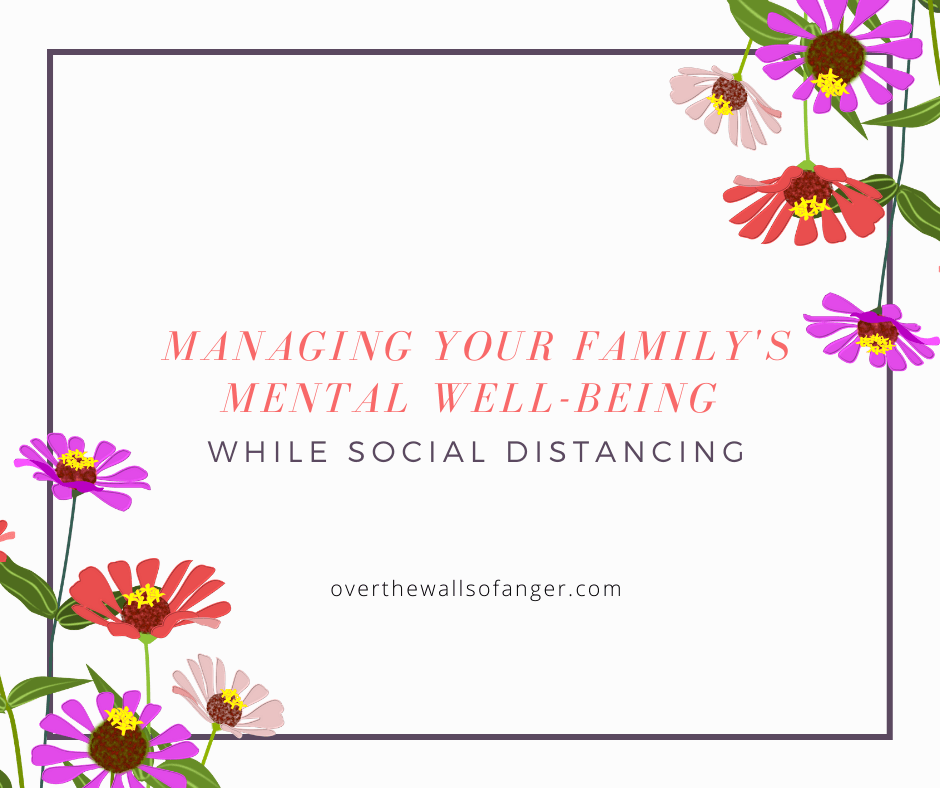7 Tips to Manage Your Family’s Mental Health While Social Distancing

COVID-19 has changed how we currently live our lives. Personally, I went from a mother and wife on maternity leave, to a teacher, full-time chef, parent, wife, and part-time worker.
It has been trying, to say the least. The reality is social distancing and working from home will most likely continue for a while. So, here are some helpful tips to keep your home running smoothly.
1. Assess the needs of everyone in your home
Ask yourself, are everyone’s needs being met? Consider Maslow’s Hierarchy of Needs, listed in order of greatest need. Focus on the first three primary needs.
- Physiological – Are we eating healthy and drinking water? Is everyone warm and getting the proper amount of sleep?
- Safety – Does each member of my household feel safe and secure? If not, how do I create a safe place for them?
- Belonging and love – Does my child or spouse need a hug, affirming word or encouragement today?
- Esteem – Are there small tasks/chores that each person can contribute around the home with to feel accomplished?
- Self-actualization – How can I achieve my full potential in this season of life?
2. Get organized
When you need to balance the schedule of more than one person, getting organized will help you prioritize tasks and balance the needs of everyone. Keeping up a routine provides both children and adults with a sense of consistency and structure that can be comforting in a time of uncertainty. Keep to regular meal times and sleep times.
3. Coordinate Work Needs
If you have children, and you and your spouse need to keep working, consider these tips for keeping everyone moving forward.
- Outline your work requirements and share them with each other.
- Consider whose schedule can be flexible and whose is more rigid. For example, if you’re married to a teacher, chances are they will need to be online at a certain time for work. Collaborating to balance the work needs of everyone will help each partner feel heard and valued.
- Be flexible. What might work for week 1 might not work for week 4.
- When your workday ends, stop working! Don’t let work take over. You still need a home life.
4. Schedule Self-Care
The Oxford dictionary defines self-care as, “the practice of taking action to preserve or improve one’s own health”, and “protecting one’s own wellbeing and happiness.” You can’t rely on others to manage your self-care—it is your individual responsibility.
This can be as simple as going for a run, listening to music, taking prescribed medication for your wellbeing, reading a book, praying and meditation, or taking a hot bath.
Schedule self-care into your routine, or else, chances are, you won’t get it done.
5. Be reasonable
Even if our kids miss a couple of months of school, you can help them get through this. Listen to their teachers’ recommendations, and don’t overdo it.
Your kids are anxious too. Give them work to focus on. But mostly, just be available to them. They may not know how to handle their huge feelings!
Listen, comfort, validate (“Yes, this sucks and it’s scary, I’m a little scared too. Here’s what has helped me, ________”) – deep breathing, faith, realizing it’s okay not to be okay.
6. Create Family Goals
Work together with your family to have some goals that would be beneficial for your family’s wellbeing. There are many online tools to help anyone learn to play music, dance, stay fit, draw etc. As a family you can learn something new or work on a project that will bring the family together for a common purpose.
7. Connect
Connect with people on social media, FaceTime with family, call up friends, host a Facebook party, say “hi” or smile at a neighbour from afar and don’t forget to check in with people who are not online.
We are all navigating in new territory, so give yourself a break. Schedules will need to be re-evaluated and priorities will change.
Be kind to yourself and each other. Remember social distancing is temporary, not permanent.
